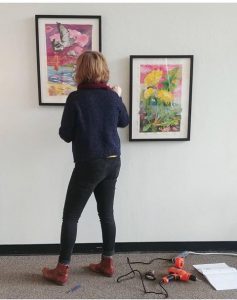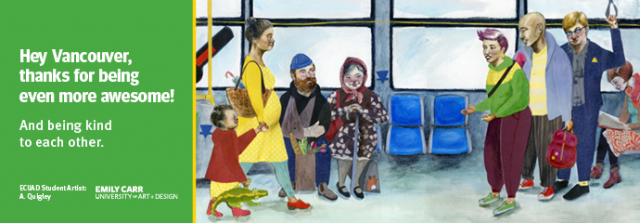Q&A: Spotlight on Emily Carr student Autumn Quigley
Q&A: Spotlight on Emily Carr student Autumn Quigley


When illustrator Autumn Quigley first moved to Vancouver, the diversity of the city really appealed to her. So, when the time came to design a transit etiquette illustration for TransLink, she went back to this cultural aspect of her new home.
Autumn is a recent graduate who majored in illustration from the Emily Carr University of Art + Design (ECUAD), whose artwork depicting transit etiquette is currently displayed on our transit system.
TransLink’s recent collaboration with ECUAD aims to take a look at transit etiquette through the eyes of students who are also transit users themselves.
More than 40 students of the fourth-year illustration course at ECUAD, taught by Professors Justin Novak, Amory Abbott, and Daniel Drennan ElAwar, brought their own sense of creativity to the project.
Autumn chatted with our social media team about how art in public places serves a purpose.
Tell us where you’re from.
I’m from a small town in the Columbia River Gorge in Washington State.
Why did you want to work with TransLink?
I come from a rural area without access to public transportation. While I was attending school at ECUAD, TransLink was a huge part of my experience of the Lower Mainland. It’s really exciting to leave something behind that will hopefully make other people’s experience of public transit a little more pleasant. It’s also really important to me that people have access to art in public settings and it was exciting to have a chance to be a part of that.
Why is etiquette important – especially on public transit?
Commuting is not my favourite part of the day and chances are many other people feel the same way, if we can make that easier on each other by taking other people into consideration it’s going to benefit everyone in the end.
What motivated you personally to work on something like this?
I really love having assignments and parameters. I have a trillion ideas and inspirations floating around in my head to the point where it is kind of an obstacle in deciding on where to put my creative energy. It sounds cliché, but I enjoyed the challenge to work on something that was different than what I would normally do and that had fairly clear specifications.
Have you ever worked on a campaign like this before?
In the fall on 2017, I took a class on illustrating for institutions and we did some assignments that were similar in ways, but this was my first time working with a client on something like this.
What was the biggest challenge for you?
I usually work traditionally, meaning with mediums such as watercolour, gouache, collage, ink, and pencil crayons, etc. So for me, one of the big challenges was then taking the piece into a digital platform and being really serious about the quality of my scan, finished file, etc. Knowing when to stop is always hard too!

What were the biggest surprises for you creating these images?
My work often focuses on the natural world, —I’m really influenced by natural history illustration, so making a piece incorporating people and machinery was a bit of a change for me. I was surprised by how much just creating the people in the illustration made me create stories to go with them and how much I began to care for them.
What was the process and how long did it take to arrive at the final image?
Oh jeez, its hard to say, probably at least 60 hours when you consider initial sketches to final digital product. Honestly, I’m not really sure at this point though.
Describe your feelings when you found out your artwork was one of the chosen few.
Well, of course I was very excited and honoured that my piece was chosen. There were so many good pieces to choose from! However, I would have LOVED it if all of the work that I saw submitted could have been used. It would be so great to be riding transit and be surrounded by all the incredible work of my friends at Emily Carr.
Have you seen it on the system yet?
I haven’t. I’m hoping to make it up to Vancouver this Fall for a visit and am hoping to see it then.

What were the most important things you learnt in the process?
Well, one of the challenges I had was that I realized that if I didn’t physically increase the size of the original image things were going to be cut off in ways that wouldn’t be very aesthetically pleasing when it was printed and installed. I really wish I would have done a better job in taking this into account in the beginning. I could have let this slide, but I asked the advice of Professor Justin Novak and he encouraged me to take the extra time to go in and fix the problem, knowing that the extra time spent would make me feel better about the end product. So I guess I learned the “measure twice, cut once” rule, so to speak. And that if you still mess it up, take the time to go back and make it right.
What are your biggest pet peeves when it came to etiquette on transit?
My number one pet peeve on transit is when people try to enter the SkyTrain before people have a chance to get off. It is totally non-sensical!
What do you hope will be the result of this campaign?
In addition to better etiquette, I would love to see more artwork on transit and in other public spaces. Especially, if that artwork could take the place of, or at least provide an alternative to, advertising.
What kind of change would you like to see with your artwork?
I would really like to be able to represent more people! One of my favourite things about Vancouver is its diversity, and I love that you see that diversity represented on public transit. How often do you see so many diverse stories sharing such a close space?
Graduates Christine Wei, Kimberly Parker, Susie Wilson, Autumn Quigley, Amy Vanden Berg, and YingChen Mai’s illustrations are now on the transit system – inside buses, and on Canada, Expo, and Millennium Line trains and stations.
Have you seen these illustrations on transit yet? Let us know what you think of them!
To learn more about etiquette on transit, visit: https://www.translink.ca/Rider-Guide/Etiquette-on-Transit.aspx
Tanushree Pillai





